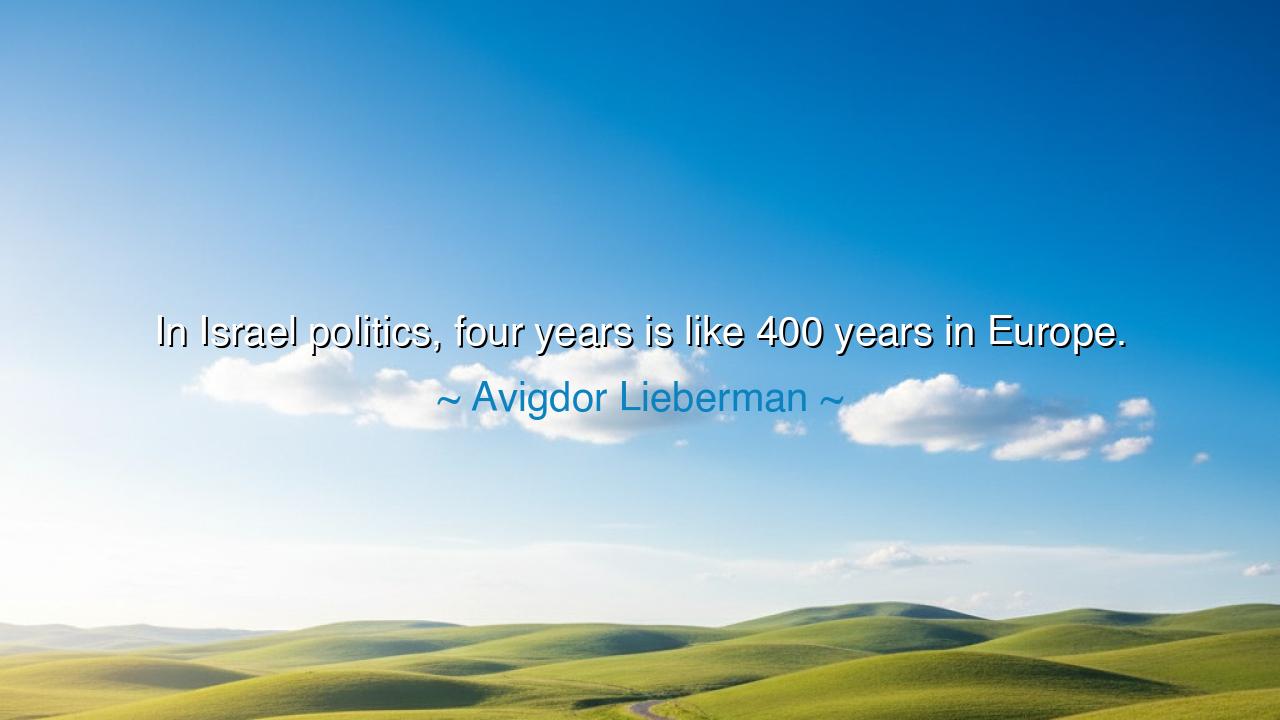
In Israel politics, four years is like 400 years in Europe.






O Seekers of Truth and Insight, hear the words of Avigdor Lieberman, who speaks with the clarity of one who understands the swift tides of politics: "In Israel politics, four years is like 400 years in Europe." In these words, Lieberman reveals a profound truth about the dynamics of political change in Israel. The political landscape in Israel is like a turbulent sea, where the winds of change blow fiercely and the currents shift swiftly. In contrast, European politics, with its deep-rooted traditions and established systems, moves at a pace that seems slow and methodical by comparison. A single year in Israel can bring about changes that, in other places, might take centuries to unfold.
Consider, O Children, the nature of Israel's politics—a land rich in history, yet also constantly evolving and facing challenges from both within and beyond its borders. In Israel, the political environment is shaped by a complex mix of security concerns, shifting alliances, and the ever-present need for diplomatic agility. The rapid pace of change and crisis means that decisions are made quickly, alliances are forged and broken with astounding speed, and the political landscape can shift dramatically within just a few short years. This is not the world of settled governance or long-standing political stability; it is a world in which survival, adaptation, and decisiveness are of the essence.
Look to the example of the Six-Day War of 1967, when Israel, faced with threats from its neighboring countries, swiftly mobilized its forces and decisively changed the balance of power in the region. In just six days, Israel's position in the Middle East was transformed, marking a moment in time when the political realities of the region shifted dramatically. That single event, which seemed like a brief flash in the broader historical timeline, was akin to centuries of change in other nations—a reflection of the urgency and rapid pace at which politics in Israel unfolds. A mere four years in Israel can feel like an eternity, a time in which leaders must act decisively to safeguard the nation's future.
And so, O Seekers, let us understand the unique nature of Israel’s political world—a world where time and political decisions move with the swiftness of a storm. The fast pace of change, the urgent need for action, and the constant reshaping of alliances make it a place where four years can indeed feel like a century. In such an environment, leaders must be agile, wise, and constantly prepared to adapt to an ever-changing reality. This lesson teaches us that in the world of politics, the pace of change is often dictated by the pressures and forces of the time. To survive, to thrive, and to lead requires the ability to move swiftly, decisively, and with foresight.
Let us, therefore, remember the wisdom of Lieberman’s words: that in some lands, the passage of time is marked by stability, while in others, it is marked by urgency and change. In a world of political volatility, the wise leader knows when to move quickly, to respond with strength, and to navigate the stormy seas of change. Israel's history teaches us that sometimes, the pace of life and politics moves faster than we expect, and those who lead must be prepared to act with both courage and vision. May we learn to embrace the lessons of urgency and adaptation, for in such wisdom lies the key to navigating the turbulent waters of the world.






TPNguyen Trong Pha
One angle is information speed: social platforms amplify scandals, polls, and provocations, turning every week into a season finale. In that environment, who benefits? Actors skilled at crisis framing often outperform quiet institution builders. Could the system deliberately slow some decisions—fixed policy windows, batch reforms, cross-party roadmaps—so not everything is hostage to the hottest headline? I’m asking whether timeline design is a democratic tool: set predictable rhythms that reward patience without dulling accountability when genuine emergencies arise.
UGUser Google
Emotionally, the line captures a kind of civic whiplash. For people living day to day—teachers, small-business owners, reservists—how do you plan a life when the public agenda keeps reordering itself? Does the constant reconfiguration encourage resilience or cynicism? I want perspectives from communities that have found anchors—local councils, mutual aid, civic education—that buffer them from the national roller coaster. If the center is turbulent, maybe durable happiness depends on cultivating reliable peripheries that outlast any coalition.
N825. Nguyen Bao nhan 8/4
If politics runs in dog years, deliberation can get squeezed. Rapid pivots can be necessary under pressure, but they also sideline public consultation and oversight. How do we keep urgency from becoming a governance habit? I’d love to hear about safeguards that protect due process during fast moves—sunset clauses, mandatory reviews, transparent impact statements. Are there areas—defense, housing, education—where stability should be privileged over agility, with higher thresholds for reversal so policies actually have time to mature?
MHMinh HoNhut
Comparisons to “Europe” feel provocative but messy. Which Europe—consensual, steady coalition cultures like Germany and the Nordics, or places like Italy that also juggle frequent governments? I’m wondering what the claim is really measuring: cabinet turnover, policy swings, security shocks, or media intensity. If the point is that context compresses time, can we build a better metric than vibe—say, an index of legislative reversals, election frequency, and ministerial tenure—to compare political tempo across systems more fairly?
UGUser Google
As a reader, I hear a warning about velocity: Israeli politics often seems to sprint from crisis to coalition to election with barely a breath in between. If policy is constantly rewritten, how do ministries plan beyond the next vote? Does the governing machinery develop “short-termism” just to survive? I’m curious what institutional designs—budget rules, cross-party compacts, independent agencies—can create continuity without dulling democratic responsiveness. Otherwise, doesn’t the perpetual churn risk exhausting citizens and hollowing out long-horizon projects?